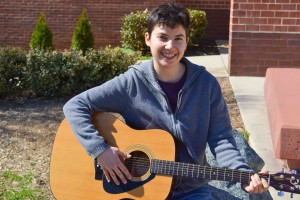Julie Lipson, MA, MT-BC
Membership Spotlight Questions
Describe your career as a music therapist—education, populations served, etc.
I have been running my private practice, Inner Rhythms Music Therapy since 2013. I am constantly surprised and delighted by the individuals and groups who reach out for services. Over the past few years, I have run groups for many populations, including transgender and genderqueer adults, adults in an outpatient addiction program, and elders in a senior living community. I have also worked with individuals of many backgrounds who are working on self-expression, identity formation, impulse control, social skills, and more. I have a Bachelor’s degree in Ethnomusicology and Women’s Studies from University of Maryland, and I received my Master’s degree from Drexel.
What brought you to the field of music therapy or why did you decide to pursue music therapy as a profession?
I have always worked in communities either providing care or playing music. Neither one was ever enough, and I generally thirsted for both simultaneously. I started to realize the therapeutic power of music while teaching a drumming and chanting class in Portland, Oregon, where I lived for four years between college and grad school. One participant told me that the drum made her feel stronger, and inspired her to speak up when her husband interrupted her. Another participant came to my class seeking stress release and meditation. It was then that I saw the potential of music, and decided to become a music therapist.
What suggestions do you have for novice music therapists?
Keep playing your own music!
What are some of your favorite resources (Websites, books, blogs, journals, etc.)?
I love reading non-clinical books that are based on diagnoses. Recently I read The Bride Stripped Bare By Her Bachelors, Even, a novel by Chris Westbury. The protagonist struggles with OCD, loves art, and decides to take a road trip—I won’t give any more away! I like this kind of reading because it reminds me to keep a holistic perspective on people who carry diagnoses. It also prevents burn out because I feel like I’m learning about something I’m interested in without actually having to feel like I’m reading something academic.
Tell us about one of your most favorite moments of being a music therapist.
My favorite group to run is a Transgender and Genderqueer Music Therapy Group. In that group I focus on decreasing the censored creative self. Many people who are exploring their gender have received messages as children that their creative expression is not okay. It is inspiring to see people tackle that head-on, jumping into a creative space in order to find safety and authenticity.
Describe a challenge you have had in your career and what you did to overcome it.
The biggest challenge of my career–albeit self-imposed– was starting a private practice! It’s really just marketing 24/7, and dealing with all the facets of being a small business owner. I love it, but it is a challenge to structure my own time, not become a workaholic, and build in time for self-care. The best thing I’ve done is differentiate between self-care days and days off. A self-care day may have scheduled items like an acupuncture appointment. A day off, however, is a day off!
What goals do you have for the next few years?
I am excited that I recently welcomed a new music therapist into the practice. Jennifer Swanson, MMT, MT-BC and I are now partners at Inner Rhythms Music Therapy. Now that there are two of us, our goal is to continue expanding the practice in order to provide music therapy to more people in the Philadelphia area.
Do you have hobbies outside of music?
Yes! I love cooking, biking, lying in the park, and navigating the wonders of communal living.
Why you are a member of MAR-AMTA?
I am a member because it is important and uplifting to be connected to other music therapists. Especially in a profession where are always explaining what we do, I find it inspiring to stay connected to others in the field.
Thank you for sharing with the MAR!

